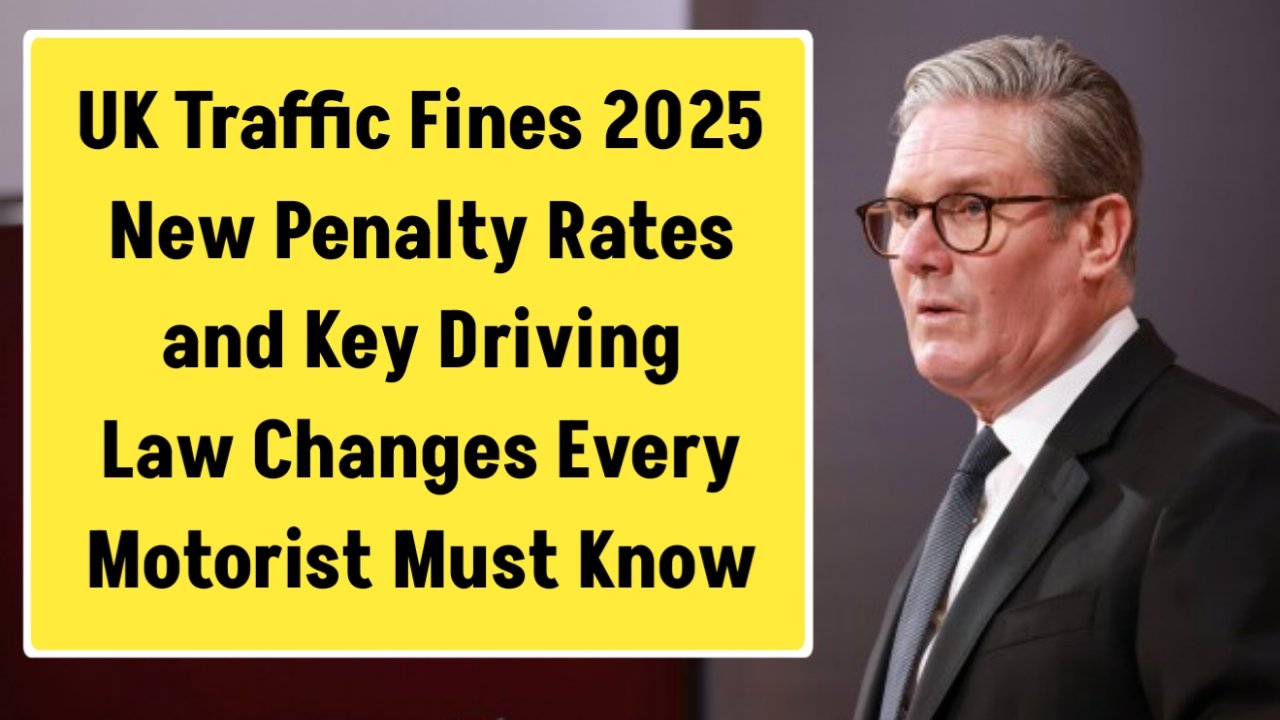UK Traffic Fines 2025: In 2025, speeding fines in the UK have been revised to ensure stricter enforcement. The base fines remain tiered, but penalty brackets have been tightened.
For minor speeding offences (Band A), the fine still starts at 50% of weekly income. However, the threshold for Band B and Band C offences has been lowered, meaning more drivers could face higher fines for moderate to serious speeding. Band B fines now begin at 100% of weekly income, and Band C at 150%, with a possible disqualification period of up to 56 days.
Mobile phone use while driving
New technology and enforcement rules now target mobile phone usage more strictly. Drivers caught holding or interacting with their phones, even briefly, while behind the wheel face a £200 fine and 6 penalty points on their licence.
Even touching the phone while stationary at traffic lights or in traffic is now considered an offence. Police are using dashcams and public reports more extensively to detect offenders.
Seatbelt enforcement
Not wearing a seatbelt can now lead to a fixed penalty of £100 and three penalty points. Previously, there were no points attached to this offence. This move aims to increase seatbelt compliance across all age groups.
Children not properly restrained in child seats or appropriate belts can result in parental fines of up to £500.
Parking rules revised
Parking enforcement has shifted significantly. Councils across the UK now have extended authority to issue fines through camera systems and ANPR (automatic number plate recognition).
- Fines for parking in restricted zones now start at £70.
- Blocking pavements or cycle lanes can attract fines up to £160.
- Persistent offenders may see their vehicles clamped or towed without warning.
Drink-driving penalties
The UK continues its zero-tolerance approach to drink-driving. In 2025, the penalty bands have been adjusted:
- First-time offenders can expect a fine of up to £5,000.
- Driving bans can range from 12 to 36 months depending on alcohol levels.
- Repeat offenders or those involved in accidents may face prison sentences of up to 6 months.
Police have increased random roadside checks, especially during weekends and holidays.
Drug-driving laws tightened
Drug-driving detection has improved due to better testing equipment. Penalties include:
- A minimum one-year driving ban
- Unlimited fines
- Up to 6 months in prison
Prescription drugs are also under scrutiny. Drivers must prove their medication does not impair their driving ability.
Vehicle condition penalties
Driving with a poorly maintained vehicle now results in harsher fines. Key issues include:
- Worn tyres, faulty lights, or broken windshields
- Expired MOT certificates
- Illegal exhaust modifications
Police are empowered to issue fines of up to £2,500 and issue prohibition notices on the spot.
New emissions-related penalties
With environmental concerns growing, emissions-based penalties are stricter in 2025:
- Entering clean air zones (CAZ) without compliance results in fines starting at £120.
- Non-compliant diesel vehicles face additional charges in urban areas.
Many councils now use real-time monitoring systems to issue fines instantly.
Speed limit reductions in urban zones
Several cities have reduced speed limits in residential and school zones to 20 mph. Speeding in these zones brings higher fines and potential bans.
The initiative aims to reduce accidents and promote pedestrian safety. Local authorities have ramped up signage and digital alerts to ensure compliance.
Licence points and bans
Accumulating 12 or more penalty points within three years results in a driving ban of at least 6 months. For new drivers (within two years of passing), 6 points can lead to immediate disqualification.
This strict policy urges drivers to stay aware of their current point status and avoid habitual infractions.
Insurance and undeclared penalties
Failing to declare driving offences to your insurance provider can now result in policy invalidation. Insurers are legally allowed to cross-check point records.
Driving without insurance, intentionally or otherwise, leads to:
- On-the-spot fines of £300
- 6 penalty points
- Vehicle seizure in serious cases
Final thoughts
The 2025 updates to UK traffic laws and penalty structures reflect a stronger focus on safety, environmental concerns, and technology-driven enforcement. Every motorist should stay informed and drive responsibly to avoid harsh penalties and maintain road safety.
Regularly checking local council updates and using DVLA services can help keep your vehicle, licence, and records compliant with the latest rules.

